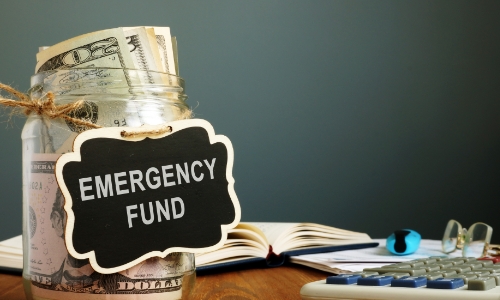When to Tap Into Your Emergency Fund (and When Not To)
Wondering if it’s really an emergency? Learn when it’s the right time to tap into your savings.

Each year countless Americans face an expensive, unexpected cost. Whether it’s a trip to the emergency room or a broken furnace in the middle of winter, these surprises can quickly strain your finances. That’s why having an emergency savings account is essential. Start building yours today to stay ready for whatever life throws your way.
Common Expenses
- Medical Bills
Health emergencies can happen at any time—and even with insurance, they’re often expensive. From unexpected ER visits to necessary procedures, medical costs can pile up fast. An emergency fund helps ensure your focus stays on healing, not finances.
- Home Repairs
Your home is your haven, but when something breaks, comfort can quickly turn into chaos. A burst pipe, broken furnace, or electrical issue often can’t wait—and they rarely come cheap. Emergency savings help you fix problems fast without draining your wallet.
- Vet Bills
When a pet gets sick or injured, the last thing you want to worry about is money. From surprise diagnoses to emergency surgery, vet bills can add up in an instant. A savings cushion gives you peace of mind to care for your furry family members without hesitation.
- Car Repairs
Vehicles are essential for daily life, but they can also be a major source of unexpected expenses. Whether it’s a sudden breakdown, a flat tire, or damage from a wreck, car repairs often come with little warning and a hefty price tag. Even routine maintenance can add up over time. Having emergency savings set aside can help you handle these costs without derailing your budget.
- Natural Disasters
The weather can be unpredictable, and natural disasters often strike suddenly, leaving behind damage that’s both emotional and financial. Whether it’s a tornado, flood, wildfire, or hurricane, every region faces its own set of risks. While insurance can help, it doesn’t always cover everything, and recovery costs can add up quickly. An emergency fund gives you the flexibility to respond, rebuild, and recover without added financial stress.
- Job Loss or Inability to Work
Even as the economy stabilizes, many individuals still face uncertain job prospects. If you ever find yourself in a situation where your job is at risk, having an emergency savings can make all the difference. This financial cushion can help cover essentials like rent, groceries, and bills while you search for new opportunities.
When to Use Emergency Savings
Before tapping into your emergency fund, ask yourself the following questions:
- Is it unexpected?
- Is it urgent?
- Is it necessary for health, safety, or survival?
If the answer to all of these is yes, then it is likely a real emergency, and you can use your emergency savings account.
How Much To Keep in an Emergency Fund
To figure out how much you should keep in your emergency fund, start by calculating your monthly expenses—the things you need to cover no matter what, such as :
- Rent or mortgage
- Utilities
- Groceries
- Insurance
- Transportation
Once you have your monthly total, multiply it by the number of months you want to be prepared for. Most experts recommend saving enough to cover 3 to 6 months of these core expenses. This cushion can help you stay afloat during job loss, medical emergencies, or unexpected life events.
When to Use a Savings Account
Your emergency fund is for unplanned, urgent needs, not for vacations, shopping, or regular bills. For those planned expenses, use your regular savings account. Unlike emergency funds, savings and checking accounts are meant for everyday use.
